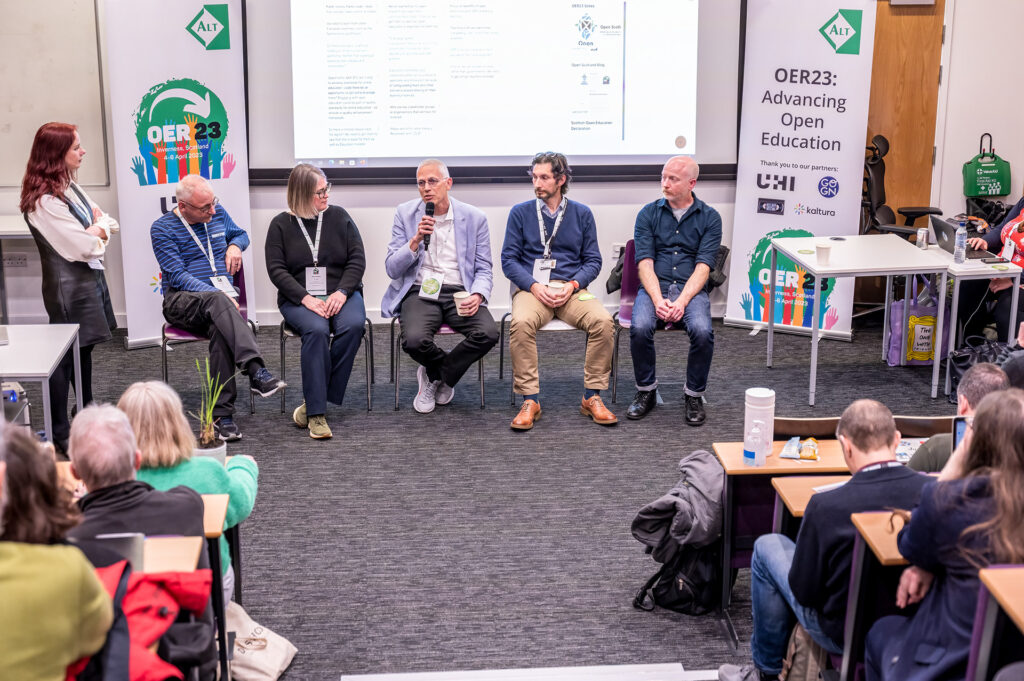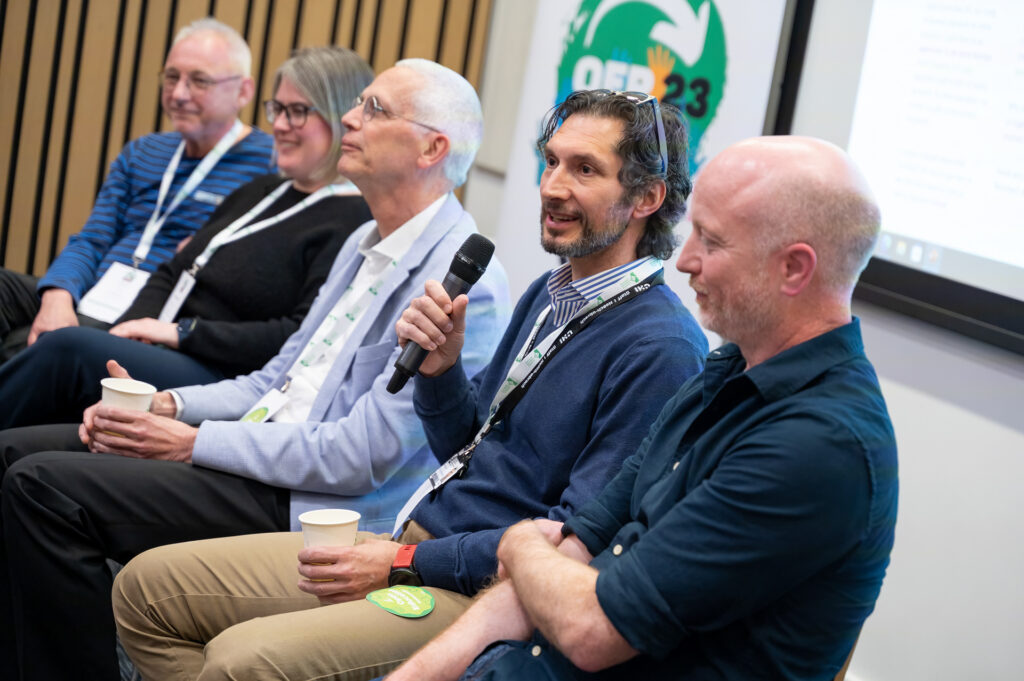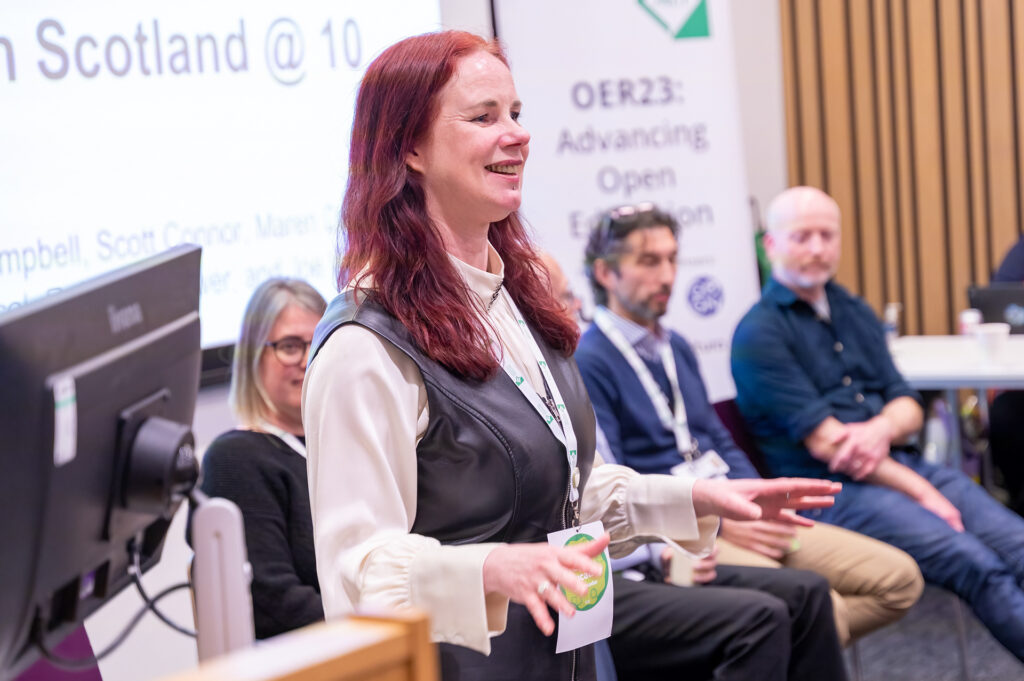This summary of the Open Scotland @10 plenary panel at OER23 by Lorna M. Campbell was originally published at OpenWorld blog.
To mark 10 years of the Open Scotland initiative, Joe Wilson and I ran two events as part of the OER23 Conference at UHI in Inverness, which provided an opportunity for members of the education community to reflect on how the open education landscape in Scotland has evolved over the last decade, and to discuss potential ways to advance open education across all sectors of Scottish education.
Open Scotland Pre-Conference Workshop
Joe has already written up our pre-conference Open Scotland workshop, which brought together around 40 colleagues, in person and online, to discuss key challenges and priorities. You can read Joe’s summary of the workshop here: Open Scotland Reflections on Pre-Conference Workshop.
OpenScotland @10 Plenary Panel
The closing plenary panel of OER23 brought together open education practitioners from within Scotland and beyond. Panel participants were Lorna M. Campbell, Open Scotland and University of Edinburgh; Scott Connor, UHI; Maren Deepwell, ALT; Stuart Nicol, University of Edinburgh; Robert Schuwer, consultant and former UNESCO Chair on Open Educational Resources; Joe Wilson, Open Scotland and City of Glasgow College. Each member of the panel was invited to briefly share their thoughts on future directions for Open Education, before we opened the discussion to the floor.
Stuart Nicol, Head of Educational Design and Engagement at the University of Edinburgh, acknowledged that while it’s disappointing that there hasn’t been more support from Scottish Government, there has been a support for open education at a number of institutions, including the University of Edinburgh. Stuart highlighted the important role of committed people who have pushed the open agenda within institutions. Short of having government level commitment and policy, Stuart suggested we need to provide opportunities for people to come together to share practice and to encourage institutions to work together.
Scott Connor, Digital and Open Education Lead at UHI’s Learning and Teaching Academy, outlined UHI’s strategic commitment to open education which is underpinned by an OER Policy and a framework for the development of open educational practices. Scott highlighted lack government mandates and funding as a barriers to engagement with open education and suggested that real impact would come through the government adopting the Scottish Open Education Declaration and using it to mandate that resources created with public funding should be shared openly to benefit everyone.
Both Scott and Stuart highlighted the OER policies adapted and adopted by the University of Edinburgh and UHI as a prime example of open education collaboration.
Robert Schuwer, independent consultant and former UNESCO Chair of OER, provided an overview of open education in The Netherlands where the government has supported a range of OER initiatives and stimulation grants since 2006. In 2014 the Education Ministry issued a strategic agenda stating that by 2025 all teachers should share their learning materials. Although some institutions such as TU Delft are front-runners, other smaller institutions are just getting started.
Robert suggested that the biggest challenge is to cross the chasm from early adopters and innovators to the majority of teachers to encourage them to adopt principles of openness in education. He suggested connecting to teachers passion, which is teaching, not sharing materials, and highlighting how open education can help them to become better teachers.
Maren Deepwell, CEO of the Association for Learning Technology, reminded us that we’re not just talking about openness in Higher Education we’re looking at all sectors including schools, training, vocational education, FE, HE, and research. UK Government looks at Open Access research and thinks the open box is ticked. ALT has tried to reach out to both Scottish Government and the Department of Education, but often there is no one with responsibility for open education policy beyond Open Access and Open Research funding.
Maren noted that we tend to see open education as another challenge alongside Brexit, the cost of living crisis, climate change, sustainability, etc., and ultimately it is never at the top of the agenda. She suggested that our opportunity is to present openness as a way to solve these challenges. It’s ingrained in us that openness is the extra step that teachers need more time, more funding, more skills, to take. Instead we need to highlight how openness could solve resource scarcity and training issues, and help small independent providers collaborate across sectors. We need to show openness as a way to solve these challenges, rather than as a stand alone challenge in its own right.
Opening the discussion to the floor, members of the community put forward a range of comments and suggestions including:
- Taking a whole population approach to education rather than a sectoral approach. Open education is a way to educate for all our futures, not just those who can afford a good education. Open educators should collaborate with demographic data experts to see how open education could address key challenges of our ageing population, including health and social care.
- Start with early interventions at primary school level. How do children learn, what do they learn, what role models do they see? Start to train a new generation of people to think in different ways. Currently there is no mention of openness in the General Teaching Council programme, but a logical place to start would be with teaching staff who are teaching children how to learn. However because of concerns about GDPR, teachers work in closed environments, there are challenges around safeguarding and managing digital identities.
- Scotland’s baby box has been an import mechanism for learning for both parents and children, why not add a leaflet about open education?
- Scotland has always had a very egalitarian tradition of education, the principles of openness fit well with this tradition, from school all the way up, so it’s frustrating that we haven’t been able to introduce open education at school level.
- Maybe we’re trying too hard to change policy, perhaps it would be better to focus on doing fun stuff and sharing open practice. Do what you can at the small level; small OER, rather than big OER. This can be really powerful. Sharing in small ways can make a difference.
- People hear about Open Scotland and are interested in open education, but they’re constrained by their local authorities or their college marketing teams.
- The strength of open education is in the grass roots, as soon as it get sucked into politics, it gets watered down. There is a risk that comes with government policy and funding. You cede some control when policy is dictated at that level. At grass roots level we can control it, shape it and manage it. It’s hard work pushing upwards but there is a danger when it comes from the other direction that we lose something and open education gets co-opted by people we may not wish to work with.
- Robert Schuwer countered this point by noting that this has not happened in The Netherlands. Government support is provided at all levels of education but there is a lot of autonomy within institutions. The only mandates were the 2014 strategic agenda and a 2020 Open Access research mandate, both of which have been beneficial. Robert also noted that students lobbied the Education Minister and had directly input to the 2014 sharing agenda. This was also the case at the University of Edinburgh, where EUSA encouraged the University to support open education and OER.
- We have a political problem in that our education ministers don’t know much about education, so openness is never a priority. We need to trust ourselves and continue with the grass roots work. We need to feed messages up to government ministers that open education can be a solution to sustainability and other strategic agendas. We need to take our advocacy up a notch, perhaps take out an advert in the press.
Next steps
The next step will be to continue synthesising the outputs of the workshop and plenary panel, captured in this Padlet, with a view to drafting a new Open Scotland manifesto to share with the community and move the open education agenda forward.



